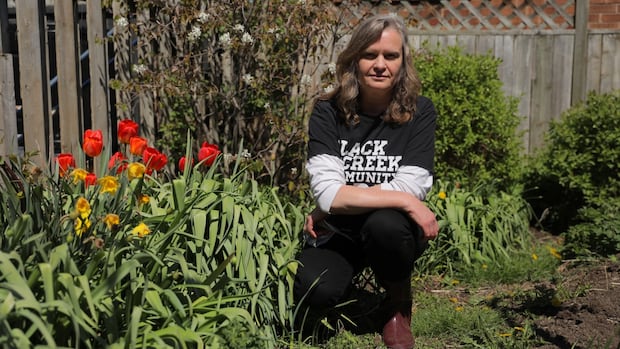To Tim Durling, the time spent in his shop in Saint-Antoine chiselling used pallets into play structures for children is more than just a way to pay the bills.
It’s what saved him from a life derailed by addiction.
“I probably spend too much time here, but it’s what was created as my safety blanket,” he said, covered in a layer of sawdust and sitting in front of a wooden playhouse and plane.
A little more than 10 years ago, Durling was in the throes of drug addiction, on the run from the police, and separated from his three children.
What began as a hobby to keep him busy as he began his recovery became the turning point to a better life.
He created Pallet Works NB, which is now busier than ever.
A weekly support group he started for teens in Moncton has been going strong for nine years.
And he has reconnected with his own children.
Durling has told his story countless times to students in local schools and through his work as an addictions counsellor.
“I keep my reality very close to me,” he said. “I don’t forget the people I hurt . … I don’t want to go down that road again.”
Eva LeBlanc first met Durling when she started a six-month recovery program at Portage Atlantic, a drug rehabilitation centre for young people.
She was 16 when she was at Portage, southwest of Sussex, and would meet with Durling at least once a week. She said he was introduced to her as “the funny one” who could bring levity to an otherwise tense process.
“It was like one of the first times that I had a genuine laugh being in my program, which really stuck with me.”
Tim Durling’s path to recovery has led to a woodworking business and a support group for teens, where he offers what was missing in his own life.
LeBlanc, now 19, still contacts Durling whenever she feels overwhelmed with her recovery.
“I felt accepted by him,” she said. “To be able to talk about it with someone that has been through it and that understands it to the core, really means a lot.”
LeBlanc is going to be four years sober in November. She still attends the weekly support group Durling offers for teens in Moncton every Tuesday at the North End YMCA in collaboration with the Anglophone East School District.

For nine years, Durling has dedicated his time to helping teens like LeBlanc who are battling addiction or at risk of it.
He calls the support group the Chase.
“That’s an opium expression, where you’re chasing that high,” Durling explained. “You’re always chasing that dragon and you never catch it.”
Durling not only supports teens after they get sober, he also works to prevent them from falling into addiction.
He knows that, as with many who face addiction, his story could have ended another way.
Abuse at heart of addiction
Growing up in Sussex, Durling said, he “came from a good family,” played competitive hockey and had many friends through the sport.
When he was nine years old, he said, he was sexually abused.
“I had that trauma in the back of my head that just ate me up,” he said. “It made me an aggressive person and made me a violent person. It just changed me.”
Durling said he came to terms much later in life with the fact that the abuse was the underlying cause of his addictive behaviour. It’s what led to an alcohol addiction in his early teens, and a cocaine addiction in his early 20s that lasted into his 30s and 40s.
He and his former wife owned a bar in Moncton for 13 years, which he said enabled his lifestyle.
“It just became a playground for me … drug dealers, that’s where they hung out, that’s what they did,” he said. “It went from a recreation to a necessity real quick.”
In the early 2000s, Durling went to a rehabilitation centre for the first time. His sobriety lasted about a month or two, he said, and then the cycle started again.
In 2014, when he was 44, Durling hit what he considers rock bottom. He refers to it as his “summer of insanity.”
He was unemployed, and while he didn’t consider himself homeless, he didn’t have a permanent place to call home.

“I had dug myself in such a hole,” he said. “I had burned every bridge. No one believed anything I said. No one wanted me around and I don’t blame them.”
After a short stint in the Southeast Regional Correctional Centre in Shediac, he ended up on the run from police for 30 days because of another charge.
He isolated himself from his family and remembers his young son asking him to be part of his life.
“My son was at an age where he was like, ‘Dad, where are you?'” he recalled. “There was a side of me, too, that really wanted to be with my kids and wanted to be a better person.”
Determined to turn his life around, he moved in with his parents in Sussex. That’s where he watched hours of YouTube tutorials, teaching himself to turn old pallets into coffee tables in his parents’ garage.
For months, he sold rustic-style creations online and eventually launched Pallet Works NB.
Even though his daily life was headed in a better direction, he said, his addiction still wasn’t.
Providing support, then finding it for himself
In 2015, Durling began volunteering at Portage Atlantic. That’s when everything changed.
“I really felt at home,” he said. “When you hear a kid share about their own trauma, you’re like, ‘I can relate to that.'”
Durling said it made him think about his own journey and how he hadn’t dealt with issues related to his addiction. He confided in staff there, bought into the programs at Portage himself and got clean.
“If I hadn’t got that first shot, I don’t know where my life would be right now because that was a life-changer,” said Durling, who now lives in Shediac Cape with his girlfriend of four years. His Pallet Works shop has been moved to Saint-Antoine, about 34 kilometres northwest of Moncton.
Eva LeBlanc describes Durling’s support as “a comfort blanket” and said his transformation has led to the transformation of many, including herself.
“He dedicates his life to helping people, which is something that you can’t say about a lot of people. He is a lot of people’s saviour, in a way.”








